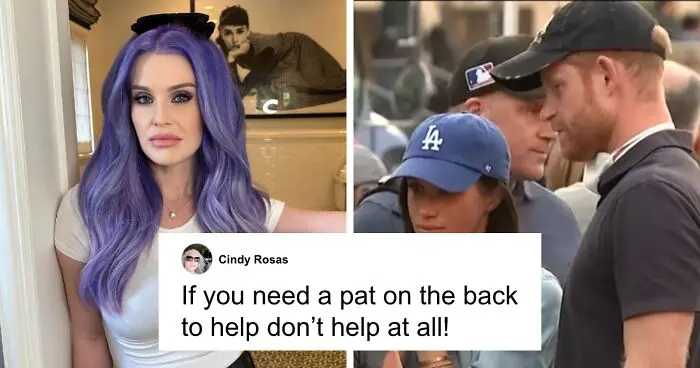In the wake of the devastating Los Angeles wildfires, Kelly Osbourne has taken a firm stand against certain celebrities she perceives as exploiting the tragedy for their personal gain. The fires have decimated whole neighborhoods, left countless families displaced, and claimed lives; yet Osbourne worries that some entertainers see this chaos as an opportunity for social media fame. Her comments reflect a growing concern that celebrity culture often prioritizes publicity over empathy.
This is not just an isolated incident; it strikes at the heart of a broader trend where public figures appear to capitalize on disasters. Osbourne didn’t pull any punches, stating, ‘It’s absolutely unacceptable to use tragedies as a backdrop for your online persona.’
The Unfolding Crisis in Los Angeles
The wildfires in Los Angeles have wreaked havoc, with reports indicating thousands of homes destroyed and many people left homeless. The emergency has drawn attention from not just local officials but also has sparked conversations among celebrities about their roles in such times.
‘It’s shocking and disturbing,’ she added, highlighting the social media posts she referred to, which contained selfies and staged images taken near the fire sites.
The Impact of Celebrity Culture
Celebrity culture has always had a profound influence on public perception and social norms. In times of crisis, how celebrities choose to respond can significantly shape the narrative and public sentiment. According to Osbourne, the tendency among some stars to transform serious issues into photo opportunities is not just inconsiderate but downright troubling.
She expressed disappointment, noting that the focus should be shifted toward support and compassion for individuals directly affected by the fires. In her view, using their suffering for self-promotion is an egregious error lacking in respect.
Examples of celebrities sometimes failing to grasp the severity of situations can be seen broadly across various events, from natural disasters to global humanitarian crises. By filtering these events through a lens of personal branding, celebrities can unintentionally trivialize the suffering experienced by real people.
Examining Social Media Reactions
The emergence of social media has revolutionized celebrity interactions with the public, but it has also blurred ethical lines. Osbourne’s comments brought light to how easily these platforms can be misused. ‘People are more concerned with likes and shares than actual human lives,’ she stated rhetorically, illuminating the dichotomy between online presence and real-world compassion.
As the wildfires wreaked havoc, social media platforms were flooded with posts from individuals, including celebrities who appeared to downplay the gravity of the situation. The ‘likes’ on their posts may boost their social standing, but at what cost? Osbourne suggested that such behavior creates a toxic cycle that reinforces self-centered tendencies within the celebrity ecosystem.

A Call for Responsibility
Osbourne’s urgent call for responsibility resonates deeply amidst the current climate of disaster and disunity. She highlights the need for celebrities to take a step back and reassess their roles during tragic events. It’s not merely about having a presence; it’s about fostering genuine connections and supporting the affected communities.
Particularly during moments when nature demonstrates its ferocity, family and community at the heart of the terror should be prioritized above social media engagements. Osbourne advocates for direct action—urging followers and fans to support local relief efforts rather than simply documenting events online.
She stated, ‘Let’s use our platforms to make a difference, not to seek attention,’ encapsulating the spirit of accountability she hopes to see during such difficult periods. The responsibility falls not only on celebrities but also on the media and the public, all of whom play a role in shaping the conversation.
Addressing Systemic Issues
The backdrop of the wildfires reveals systemic challenges that require attention beyond celebrity behavior. The calamities faced by those in Los Angeles speak to broader issues of environmental neglect and insufficient support for communities vulnerable to disasters.
Moreover, her remarks catalyze an important conversation around the ethics that surround public figures when disasters strike. There’s an opportunity for celebrities and influencers to pivot from mere publicity stunts into becoming champions of accountability and advocacy.
This shift could empower celebrity culture—transforming it from a mere echo chamber of vanity into a genuine force for good. As celebrities bear the distinction of influence, their conduct plays a significant role in shaping public attitudes and behaviors during turbulent times.

Changing the Narrative
Changing the narrative around crisis response is essential, especially when it involves lessons learned from public figures like Osbourne. The opportunity exists for all to contribute to a more compassionate discourse surrounding disasters, urging us to lean into empathy over sensationalism.
By turning attention toward community efforts, celebrity involvement can positively impact countless lives. Many celebrities have already taken up charitable initiatives supporting wildfire relief, aiming to make substantial contributions that align with the sincerity of their outreach.
As Osbourne states, the awareness must extend beyond individual conduct and channel into a movement advocating respect, dignity, and humanity in all circumstances.
Conclusion on Celebrity Accountability
As discussions continue surrounding the appropriate conduct of celebrities during times of crisis, Osbourne’s assertive stance serves as a reminder that empathy must prevail over opportunism. Moving forward, it becomes crucial to emphasize the responsibility each individual, especially those in the public eye, holds in preserving human dignity amid disaster and loss.
In an era where tragedy can swiftly turn into entertainment through the lens of social media, it is our collective duty to hold each other accountable. Champions of change can emerge from the darkest of moments if awareness and compassion guide our actions.
Finally, the ongoing challenge underscores a need for sincere commitment; celebrities can use their platforms for genuine improvements in communities affected by crises, fostering real connections rather than fleeting publicity. Osbourne’s outcry may just be the catalyst needed to steer these conversations in a more fruitful direction.
Hi there! I’m Jade, a 38-year-old gossip journalist with a passion for uncovering the juiciest stories in the world of celebrity news. With years of experience in the industry, I love sharing the latest trends and insider scoops.



